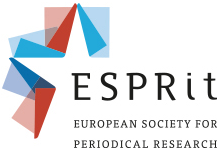ESPRit online seminar with Patrick Rössler and Mary Ikoniadou
In the Spring of 2021, ESPRit organises a series of online seminars in collaboration with ETMIET/KENI, Panteion University, Athens: Crossover influences and local identities of the popular illustrated periodicals of the 19th and twentieth centuries
The third session of the series will be held on 14 May from 3-4PM CET.
Chair: Andrés Mario Zervigón (Rutgers University)
Speakers:
1. Patrick Roessler (University of Erfurt), “From Simplicissimus to Simplicus and Der Simpl. Satire magazines between Nazi gleichschaltung and exile, 1934-35”
In 1934 and 1935, the seventy-three issues of the German-language satirical magazine Simplicus (later renamed Der Simpl) were published in exile in Prague. The editors, a team of German emigrants and Czech artists, primarily attacked the Nazi regime in the neighboring country, but their caricatures, poems, and essays criticizing the period were controversial in the exile community itself. The presentation will elaborate on the content of the magazine with a focus on its illustrators, displaying a selection of notable contributions. Moreover, it will focus on the editorial team and the quarrels between Simplicissimus founder Thomas Theodor Heine and the group of exiles in the Czech capital. Documents from the time suggest that within the exiles united by the fight against Nazi Germany, political positions were often diverse, leading to conflicts which weakened the resistance movement.
2. Mary Ikoniadou (University of Central Lancashire), “Refugee publishing. The case study of the Greek political refugees in East Germany. Imaginings and aesthetics of repatriation amidst Cold War borders”
The presentation will consider publishing as a site in which refugee populations can challenge official narratives of nationhood while simultaneously claim belonging to a 'homeland' and a national body from which they have been displaced. Through the case study of Pyrsos illustrated magazine published in East Germany in the 1960s by Greek political refugees of the Civil War, the presentation will argue that visual, and material analysis can offer an in-depth understanding of the complexity of the political refugees' claims. It will demonstrate that the juxtaposition of images and texts in the design of the magazine alongside its editorial and distribution strategies challenged the position of its readers: it invited particular ways of reading and knowing that embodied political experiences and affective responses whilst incited imagined national cultural identities.
